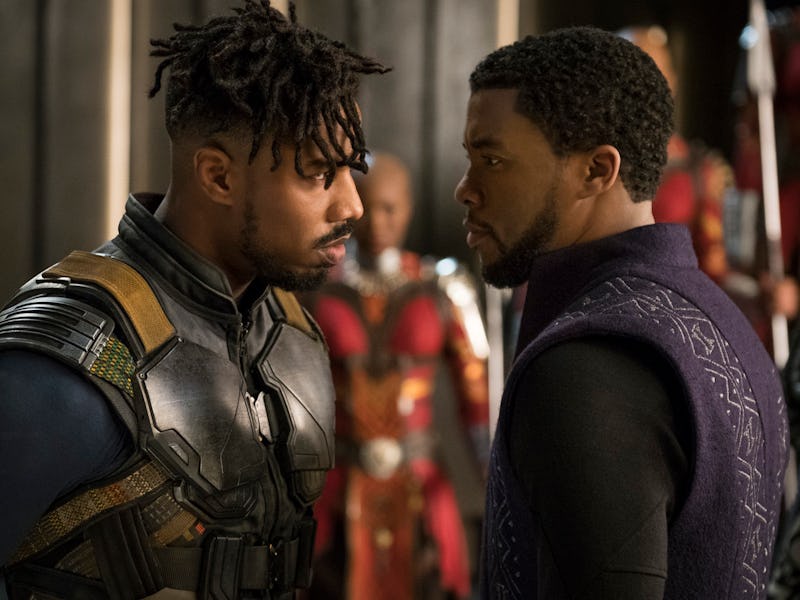Why 'Black Panther' Is So Important to Marvel's Future
The last Marvel movie before 'Infinity War' may be the most significant.

In less than a month, the Marvel Cinematic Universe will be rocked by Black Panther. Starring Chadwick Boseman and directed by Ryan Coogler, the film is poised to spotlight Marvel’s first black superhero in a fully-realized Afrofuturistic world for a worldwide audience. In a time of continued racial strife exasperated by tiresome leaders, the cinematic fantasy of an African hero from an African nation, all in the backdrop of the familiar “MCU,” will be oxygen in a suffocating cultural climate.
But even under the roof of Marvel, which in turn resides underneath the castle ceiling of the Walt Disney kingdom, there’s still too much at stake for Black Panther to potentially bomb. That Deadpool in 2016 proved moviegoers are willing to go to movies in February, is comforting. The advance ticket sales, the best in Marvel history, doubly so. But Black Panther’s significance is more than about Marvel Studios continuing its hot streak. No pressure, but Earth needs Black Panther to save the world.
In 1990, two years before his death, comics legend Jack Kirby explained why he created Black Panther for Marvel in 1966. Being close to 90 and having lived through very different times, his vocabulary is hard to swallow, but his sentiment shines through. “I came up with the Black Panther because I realized I had no blacks in my strip,” he told The Comics Journal. “I had a lot of black readers. My first friend was a black! And here I was ignoring them because I was associating with everybody else.”
Black Panther's introduction to comics in 'Fantastic Four' in 1966 remains both revolutionary and dated.
Again, guy had dated syntax, but Kirby saw there was something missing in his pop culture and promptly fixed that. For a medium with so many colorful costumes and colorful panels, the characters made by Kirby, Lee, and the rest of Marvel’s bullpen were super white. Kirby knew it. So without much fuss, they made T’Challa, the Black Panther, in Fantastic Four #56. T’Challa was/is the warrior-king of Wakanda, an isolated African nation never subject to the indignity of European colonialism. Its people had so much technology, they were practically from the future.
Kirby felt comics needed black heroes. Hollywood, expended of Will Smith’s star power, can never have enough of them. And people, consumers of art, deserve to see the full spectrum of colors heroes come in. Last week, President Trump carelessly lumped Haiti — located in the Caribbean — with Africa, which he called a country, and all of it a “shithole.” The ignorance, profanity, and racism by Trump isn’t just of one sad man, but a voter base who will think their guy is telling it like it is.
Lupita Nyong'o and Letitia Wright in Marvel's 'Black Panther.'
Here’s telling it like it is: The world is more complicated, difficult, and beautiful than one insult can describe. And Black Panther’s mythology, though fictional, can be an antithesis to thinking that other places in the world where people of color reside are — um, a shithole.
In the early comics, Wakanda existed as a juxtaposition: a perceived savage land with chrome and steel sophistication. That image is worthy of criticism, and as good as Kirby’s intentions were, it was a very white, colonial American perspective of a fantastical Africa. But fifty years later, it’s this misguided-but-earnest formula that’s allowed a big budget sci-fi to bring to life warrior women in neck rings and men with lip plates to look as regal as a Westerosi. Science, culture, and diplomacy push Wakanda forward; see T’Challa stand before the U.N. in Ikiré Jones’s finest. One can appreciate where early Black Panther comics came from, at the same time acknowledge the black writers who have since taken over — Reginald Hudlin, Roxane Gay, Christopher Priest, Ta-Nehisi Coates, Coogler — and have taken T’Challa places the pioneers couldn’t even begin to navigate.
Chadwick Boseman, as T'Challa (left) will engage in a form of ritual combat with a political rival, Erik Killmonger (Michael B. Jordan, right) in 'Black Panther.' The action scene will make use of authentic African martial arts rarely seen in Hollywood movies.
Black Panther is a movie. It’s bound to be entertaining, packed with action and lively characters in an exciting plot. But it matters that the heroes on the screen, whom people will root for, and the world they will bear witness, is uniquely African, imagined by black creators. Marvel has been a pretty white franchise since it began in 2008. Ten years later, the possibilities Black Panther opens up, to the possibility that Marvel’s vast roster of minority superheroes can lead their own pop culture revolutions — Pakistani-Muslim Ms. Marvel, Chinese kung fu hero Shang-Chi, queer Latin-American “Miss” America Chavez, oh so many more — can inspire ethnic minority children who have yet to connect to a superhero the way their white classmates have to Steve Rogers, to Tony Stark, to Peter Parker.
It’s time. As the rapper-duo Run The Jewels put it in “Legend Has It,” the song played in the Black Panther trailer: “Step into the spotlight.”
Marvel’s Black Panther will be released on February 16.